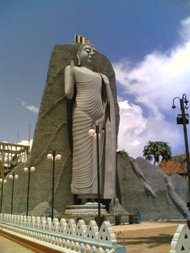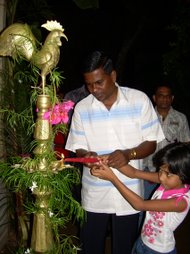Some very intriguing words
To speak another language is to live another life, says C.J. Moore in his In Other Words: A Language Lovers’ Guide to the Most Intriguing Words Around the World. Moore is only repeating a Czech proverb, a country that has suffered several occupations in the past somewhat like ours. But leaving aside for the moment why the Czech proverb arose, let us take a look at what Moore is discovering as the most intriguing words in the world around us.
It is hard for people from Europe to understand sometimes what an East Asian is saying, so says Moore. The result is a huge international misunderstanding even about a small word like Hai. Now, that word is commonly used, says Moore, when you talk to East Asians.
When an East Asian is listening to you and telling you, hai, you think he is agreeing with what you are saying. No, that is exactly what he is not expecting you to think.
He is only doing (what we tell our children at story telling time to do) hoomiti thiyanna meaning, ‘Yes, I am listening to you’ and not ‘Yes, I am agreeing with what you are saying.’
In this fashion Moore, in his In Other Words, makes very interesting clarifications for us about expressions in, what I call verbal gestures for our entertainment as well as for our information.
The Japanese have an expression - Yokomeshi, literally it means ‘eating rice sideways’ which is in itself a difficult task, but it has helped the Japanese to describe how difficult it is similarly to learn a foreign language.
This expression is derived from the style of writing used in Japan - vertically. If the same words are written sideways it will, to a Japanese, be gibberish and so just as difficult as trying to learn a foreign language.
Now, in the case of Portuguese which is spoken also in Brazil, a former Governor and journalist, Carlos Lacerda says, ‘Brazil is the only country in the world where every word is a cussword - even mother.’ Let’s try one of their proverbial expressions - for a do minico. mijar (four-er-doo pi-nee-koo, meejar) which literally means ‘missing the piss pot.’ which the English people, however, say very properly as ‘missing the target’.
But these language expressions do not get so funny when we cross over into areas far removed from so-called civilisations. The conquering palefaces totally misunderstood these unfortunate people and they suffered and continue to suffer even today as you can see from what an Australian Law Reform Commission found as recently as 1986:
“The Australian Law Reform Commission,” writes Moore, “published a report in 1986, that drew attention to the interrogating of Aboriginal suspects because of the conceptual gaps between English and, for instance Pitjantjatjara.
That tongue has no word for ‘because’ so ‘cause an effect’ and other relational aspects are conceived and expressed quite differently. Notions of time, space, number and kinship are also far removed from those of a typical English speaker.”
You can imagine the plight of such an accused who has no way of telling the police interrogator that he is innocent. The more he tries to explain the more the cop is convinced that the man is lying. Under these circumstances can we imagine that justice can be done in an Australian court to the aborigines?
Misunderstanding of law is one matter, but there are also misunderstandings in diplomacy too. Sometime ago the Chinese President Jiang Zemin was on a visit to the States.
He created a bit of a stir when in the course of one of his speeches he happened to say that democracy originated (may be as so many other things we know) in China some 2000 years ago in the philosophy of Chinese thinkers. Absurd! Thought many American Liberals. Apparently, this misunderstanding turned out to be a problem in translation.
As one American scholar of Asian studies, Elvin Geng, pointed out, “The word Minzhu first appeared in a classic work called Shuji where it referred to a benevolent ‘ruler of the people,’ that is a leader whose legitimacy rests on the people’s welfare.
In Chinese, the one term can mean ‘rule of the people’ and ‘ruler of the people.’” Moore adding a note to this comment says that both uses of Minzhu share the sense that the government ought to meet the needs of the people. This criterion may be fulfilled by an enlightened dictator or a Leninist regime as well as by a US style constitutional democracy.”
Many people here in Sri Lanka are cheesed off with this political doctrine called democracy that prevails today. They are vaguely aware that, historically, we too had a system like the Chinese where it was felt ‘government ought to meet the needs of the people.’ In that system Generosity of the ruler was the first of the ten conditions he had to observe when appointed to that great office.
Among the others listed were self discipline of the ruler followed by virtues like Uprightness, Ill Will to none and also Ahimsa. These conditions had nothing to do with religion but it had everything to do with what good governance should be wherever it prevailed and whatever religion that was followed.
To come back to the question of how the Czechs came by this proverb. It is true that their country was occupied several times over by their neighbours. Did their proverb, To speak another language is to live another life mean well or ill?
Or in other words did those who learnt to speak a new language cease to be Czechs and adopted the style of the occupying Austro-Hungarians or of the Germans or even of the Russians? One never knows.
But since we have the experience of language changes in our own country, and that too happened drastically only under the British, I think the Czech proverb can be construed as being adversarial.
At the end of the column he wrote to the International Herald Tribune Moore agrees that ‘to live another life oneself is, yes, at least to take a step towards international understanding.’
The slight hesitation he makes in saying it indicates to me that though there could be a gain there could also be a corresponding loss. Yes, that indeed is our experience. We may have achieved the dubious merit of attaining international understanding but I think it was at the cost of misunderstanding our own country and its culture.
The education we received both under the British as well as under our own government only succeeded in making most of the leaders we had or have, masters of the Anglicised way of life. Recent examples show their blatant ignorance of our country’s history, geography and our way of life.
One of these gentleman donning what has been described as the ‘kapati suit’ of the politician, derided those who said they would adopt the Dasa Raja Dharma as their model of governance and accused them of taking the country back to feudalism.
So, that is how their learning of a foreign language has helped them to understand their country’s philosophy. While surfing the Internet recently I saw this politician’s remarks on the Dasa Raja Dharma high-lighted as a ‘howler’ made along with the ‘Sinhala’ staff of the BBC’s Sandesaya who were also clueless when running down the Dasa Raja Dharma at one of their chat shows.
C.J. Moore’s valuable guide should certainly help us to understand the way of life of other people, but I am not so sure whether it would help those who lived in the former colonies of the imperialists to understand their own cultural habits better.
The final paragraph of his essay left me in two minds. I leave it to you to judge for yourself. “How does one begin to bridge such gaps?” he asks and answers. “To live another life oneself is, yes, at least a step towards international understanding. A colleague who has seen me breaking into Spanish at book fairs once commented, ‘You become another person.’ I like that.”





No comments:
Post a Comment